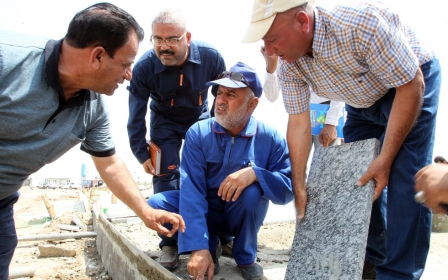Iraq's Sadr bloc says to join opposition if Maliki named PM

Parliamentary bloc of influential Iraqi Shiite leader says 'Maliki's two previous terms tell us that he will not succeed in a third'
Iraqi supporters of the Ahrar coalition, a group linked with the Sadrist movement on April 5, 2014.
The parliamentary bloc of Iraqi Shiite leader Muqtada al-Sadr said Sunday that it would join the opposition if Nouri al-Maliki assumed a third term as prime minister of Iraq.
"Al-Maliki's two previous terms tell us that he will not succeed in a third," Diaa al-Asadi, the secretary-general of al-Sadr's Ahrar bloc, told Anadolu Agency.
He said al-Sadr's bloc does not have a personal problem with al-Maliki but with his monopoly over independent agencies affiliated to the Iraqi parliament.
Al-Asadi added that by joining in the opposition to al-Maliki, Ahrar bloc will monitor the performance of his government.
Iraq's three main Shiite coalitions, including al-Maliki's State of the Law and Sadr's Ahrar, won 161 out of 328 seats in Iraq's parliament in the April's legislative election.
Al-Maliki's State of the Law insists that he must lead the new government, for a third term.
But several parliamentary blocs, including two partners in the Shiite coalition, oppose the move.
To get a third term in office, al-Maliki needs the support of 165 lawmakers.
Checkpoint blasts kill 15 in northern Iraq
Meanwhile, a roadside bomb followed by a suicide bomber detonating an explosives-rigged truck at a police checkpoint in northern Iraq killed 15 people on Monday, a local official said.
The official, Shallal Abdul Baban, told AFP the blasts in Tuz Khurmatu also wounded 115 people and caused "great destruction".
The police checkpoint that was targeted was near an office of President Jalal Talabani's Patriotic Union of Kurdistan party.
The blasts came a day after a car bomb followed by a suicide bombing near a PUK office and a Kurdish intelligence building in Jalawla, another northern town, killed 18 people.
Powerful group the Islamic State of Iraq and the Levant claimed the Jalawla attack in a statement posted on Twitter, and said it was carried out by two suicide bombers, one Egyptian and an Iraqi Kurd.
More than 900 people were killed last month, according to figures separately compiled by the United Nations and the government.
So far this year, more than 4,600 people have been killed, according to AFP figures.
Officials blame external factors for the rising bloodshed, particularly the civil war in neighbouring Syria, but analysts say widespread Sunni Arab anger with the Shiite-led government has also been a major factor.
Stay informed with MEE's newsletters
Sign up to get the latest alerts, insights and analysis, starting with Turkey Unpacked
Middle East Eye delivers independent and unrivalled coverage and analysis of the Middle East, North Africa and beyond. To learn more about republishing this content and the associated fees, please fill out this form. More about MEE can be found here.




